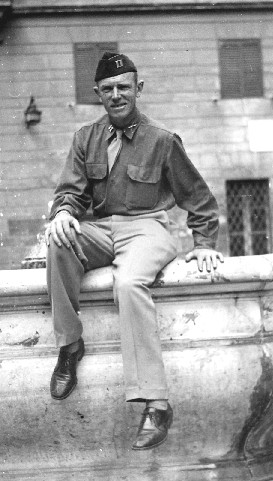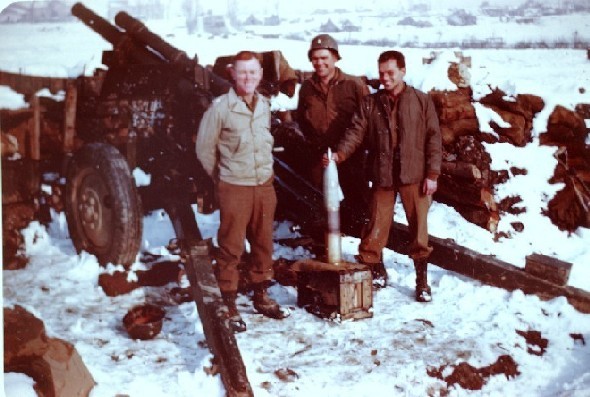
Captain William
(Bill) Dempsey
Battery
C, 328th Field Artillery Battalion,
85th
Infantry Division
Above photo taken while on leave, late in the war.
| MENU SELECTION: | The Italian Campaign | At The Front | Books | Armies | Maps | 85th Division | GI Biographies | Websites |

Captain William
(Bill) Dempsey
Battery
C, 328th Field Artillery Battalion,
85th
Infantry Division
Above photo taken while on leave, late in the war.
Captain Bill Dempsey was a member of 328th Field Artillery and served with my Dad throughout the war in Italy.Before the War
Captain William (Bill) Dempsey was born in New York City on September 2, 1914. At a young age, his family moved to the Bronx, and in 1929, to Mineola, Long Island. He graduated from Fordham College in 1935, and from Fordham Law School in 1938. In 1941, he was drafted into the Army.Training Experience
On December 7, 1941, Bill was attending services at St. Patrick’s Cathedral with his fiancé, Frances Breen. Upon learning of the attack on Pearl Harbor, Bill responded to Camp Upton in Suffolk County. From there, he progressed to Camp Dix, New Jersey, then to Camp Shelby, Mississippi and Fort Sill, Oklahoma, where he attended Officers Candidate School. Bill relates that the instruction was rigorous and the training exercises were challenging. At graduation, he had a short but eventful encounter with the assignment officer. As he later described the interview, the officer said in substance, “Bill, I see that you had calculus and physics as an undergraduate. Would you mind if I assigned you to the field artillery?” Bill assented. In later years, Bill said that 30 second conversation probably saved his life. The majority of his class mates, who were assigned to infantry commands, did not return from the war.It was during training on the 105 Howitzers that he made the acquaintance of many splendid officers and men who would later form the core of the 328th Field Artillery: Braulio Alonso (Battery A), William Armstrong and George Brem (Battery B), his future brother-in-law, Bill Nuebel (Battery C), and Harold Goodwin (Service Battery) . There were celebrities as well. Also in attendance was Shelby Foote, who, in the 1960's, composed a definitive three volume history of the Civil War and served as a commentator in Ken Burn’s television documentary on the Civil War. There was also Eddie Andrews, who became a celebrated character actor.
Bill Dempsey at Fort Sill, OK, where he began his career in Officer Candidate School. He is wearing an OCS patch on his sleeve.
After completion of school for artillery officers, he was assigned to the 328th Field Artillery at Camp Shelby, MS. Later, he became battery commander.
PHOTO COURTSEY OF BILL DEMPSEY
Among the more benign stories Bill related concerning Eddie Andrews was the stove cleaning incident. In the 1940's, the barracks at Fort Sill were heated by pot-bellied stoves. The preferred method to clean the stove was to take a small canvas powder pack, toss it into the stove, and place a foot on the lid. When the pack ignited, the soot would be discharged through the exhaust vent. On one occasion, Eddie Andrews walked into a barracks while a cleaning was in progress. Eddie said, “What the H*** are you doing?” Bill explained the process, and, shortly thereafter, a barracks exploded with a deafening roar. It seems that Eddie had used the largest pack available to clean the pot-bellied stove.
War Experience
Bill shipped out with the 85th Division on Christmas Eve, 1943. On that day the division sailed from Newport News en route to North Africa on a converted ocean liner. There was no escort, but the troops were told that their liner could out-run the U-boats. Many of the men became terribly sea sick. They eventually disembarked in North Africa, awaiting their assignment. Bill’s unit (the 328th F.A.) was brought into line as part of the Anzio break-out in 1944. On June 4th, 1944, the 85th participated in the liberation of Rome. Bill was lodged at he Excelsior Hotel, and, along with Capt. Alonso, enjoyed a personal audience with the Pope. In the weeks that followed, Bill fought with his colleagues in the 328th to free the Italian peninsula.Bill relates that, despite his assignment to the field artillery, there were several close calls. From time to time, the Germans shelled the Allied artillery positions and on one occasion a shell landed on the rim of his fox hole. On another occasion, Bill had just emerged from a Command Post when it exploded with a tremendous roar. Everyone inside was killed. According to Bill, the Germans fired only one shot. He remarked that the German artillerists used the 88's like a sniper used a rifle.
Following the liberation of Rome, he walked through an open field to ask Radio 5th Army to play “San Antonio Rose”. On the following day, a soldier, crossing the same field, lost his leg when a land mine exploded underneath his jeep.
On still another occasion, Bill and a sergeant were ordered to scout a forward location for the placement of the 105's. Eventually they found a clearing suitable for their purpose. While they were making their observations, several German soldiers emerged from the woods. Bill and the sergeant were unarmed. As it turned out, the Germans wanted to surrender. Bill asked the officer to have his men disarm, andinvited him to ride in the jeep. Together they progressed to the Allied lines, and made it home in time for dinner.
Lt. Bill Dempsey posing next to a 155mm Cannon at Fort Sill, OK in 1942.
Fort Sill was the primary school for artillery officers.COPYRIGHTED PHOTO: BILL DEMPSEYPerhaps the most amusing story told by Bill related to an incident that occurred near the end of the war. At the time, the Allies were planning an assault across a river. They anticipated fierce German resistance. The G.I.’s were laboring at a tremendous pace in anticipation of the crossing. While Bill was in a tent, a German officer simply walked in. Bill relates that he was very animated, and clearly upset. Bill asked him to be seated, offered him coffee, and secured the presence of an interpreter. When he asked the German why he was upset, he said, “There are no gentlemen in the American Army!” When Bill asked him why he felt that way, the German said, “When I try to surrender, your men say, ‘I’m busy, Kraut, get to the rear!’ ” Bill apologized to the officer and asked him what they had on the other side of the river. The German, still upset, said in an exasperated tone of voice, “Not a G** D****** thing. They have all pulled back.” That evening, a reconnaissance team crossed in inflatable rafts. The German had spoken the truth : their troops had pulled back to a point well behind the river. The Americans crossed with no opposition, and continued their advance.
Among his reminiscences : phenomenal carnage, innumerable dead, the horrible winters, incessant rain, and the impenetrable Italian mud. But there were happy moments as well -- especially the visits to Rome and Florence. And he often told the story of looking out at night at the beautiful Italian countryside. One of the men had a portable phonograph, and in the evening he would play records of pianist Eddie Duchin.
Bill relates that when the Germans surrendered in April of 1945, there was no cheering or shouts of joy. The men took the news very quietly, sobered by the realization that they would soon be participating in the invasion of Japan. Bill was sent home awaiting his transfer to the Pacific. He was greatly relieved when Japanese surrendered following the bombing of Hiroshima and Nagasaki.
After the War
Bill was discharged in 1946 as a major in the reserves. In 1950, he was appointed to a position as an assistant district attorney. In 1956 he was elected to the District Court of Nassau County, and in 1963 he was elected to the Family Court. When he retired from the court system in 1984, he was the administrative judge of the Family Court. He continued to enjoy the company of his wife, Frances, and his children, Joanne and William, and his grand child, William Peter. He died on October 1, 2002 at the age of 88.In the years preceding his death, Bill kept in touch with his colleagues and friends from the service, visited with the family who looked after him in Hattiesburg, Mississippi, and made a pilgrimage to Italy to reminisce and pay his respects to the men who were left behind. Despite a long and varied career, he regarded his service with the Custer Division as his most important contribution to his country.
Bill Dempsey and Frances in 1999.
And with his son & daughter-in-law, Bill & Susan >
~~~~~ This biography and photos were graciously provided by Bill Dempsey, the son of Captain William Dempsey. Bill has been has been a big help relating information on the 328th Field Artillery and the officer cadre. He and his Mother have provided details of not only his Dad but the other officers that served with them. Bill has made phone calls in search of past members and their families. He has a wealth of knowledge on the 328th Field Artillery and has been an encouragement to me.

Lt. Bill Dempsey (left) with officers of the 328th Field Artillery.
A rare color photo of men in the field with a 105mm howitzer.
Photo probably taken during the snowfall of February 1944.COPYRIGHTED PHOTO: BILL DEMPSEY
Follow-up information on names mentioned in this biography.Braulio Alonso (Battery A) entered the field of education and became the Superintendant of Education for the state of Florida.
Shelby Foote was born in Mississippi delta and lived in Greenville after he studied at University of North Carolina. His first novel that gained him recognition was Shiloh (1948), a fictional recreation of the Civil War battle. From this novel he was asked to write The Civil War: A Narrative, a history of the war published in three volumes between 1958 and 1974. He was the historian commentator with the slow, Mississippi drawl in Ken Burn’s PBS documentary series on the Civil War. He served as a Captain in the 50th FA Battalion of the 5th Infantry Division. However, he was accused of insubordination because he was in Belfast without leave while visiting an Irish girl whom he later married. In 1944, Shelby Foote was court martialed and dismissed from the service.
REFERENCE: INTERVIEW with Shelby Foote about his military training at Camp Shelby. Via phone 2004.
REFERENCE SITE: The Mississippi Writers and Musicians Project of Starkville High School.Eddie Andrews became a celebrated character actor in film and TV. A few of his movies and roles inlcuded: "Elmer Gantry" (1960), "Good Neighbor Sam" (1964) as Mr. Burke; "Send Me No Flowers" (1964) as Dr. Ralph Morrisey; "The Glass Bottom Boat" (1966) as Gen. Wallace Bleecker; "Tora! Tora! Tora!" (1970) as Adm. Harold R. Stark; "How to Frame a Figg" (1971) as Mayor Chisholm. He was a character actor on many TV series: "Twilight Zone"; "Naked City"; "Gunsmoke"; "Rawhide"; "Bonanza"; "The F.B.I."; "The Beverly Hillbillies"; "The Invaders"; "Bewitched"; "Charlie's Angels" and "The Bob Newhart Show."
Return to The Greatest Generation biographies main menu.
Return to Photos from Italy top menu.
Return to CusterMen
top menu.